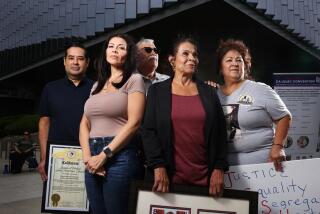Bradley Joins Opposition to Nominee for Circuit Court
- Share via
Los Angeles Mayor Tom Bradley on Tuesday joined a growing chorus of opposition to the nomination of San Diego law professor Bernard Siegan to the U.S. 9th Circuit Court of Appeals, claiming that the nominee’s “iconoclastic” views would “wreak havoc” on local government’s efforts to protect the environment and manage growth.
In a letter to U.S. Sen. Joseph R. Biden Jr. (D-Del.), chairman of the Senate Judiciary Committee, Bradley joined more than three dozen organizations urging rejection of a nomination that is quickly shaping up as a replay of the battle over the nomination of Robert H. Bork to the Supreme Court.
Earlier this month, the San Francisco Board of Supervisors unanimously passed a resolution opposing the conservative professor’s nomination, criticizing Siegan’s “extreme views,” which the resolution said were “hostile to the protection of liberty and individual rights.”
Bradley focused his attack on Siegan’s arguments that the 14th Amendment of the Constitution permits school segregation, his opposition to many decisions in the area of separation of church and state and what the mayor claimed was Siegan’s “deference” to contract and property rights.
Details Objections
“If Mr. Siegan had his way, most local and state planning ordinances, zoning rules, building codes and environmental laws (not to mention minimum wage laws) would be struck down by the courts as unconstitutional ‘takings’ of private property,” Bradley wrote.
“In short, Mr. Siegan would nullify myriad decisions made by elected representatives to protect the public’s health, welfare and safety. . . . Many of these efforts, including requiring developers to mitigate the adverse impacts of additional construction, will necessarily impinge on absolute property rights. But such measures . . . are essential to maintaining the quality of life in our cities.”
The heightened role of local government in the confirmation process reflects city officials’ growing awareness of the impact of federal decision making on the local level, said Bradley spokeswoman Dee Dee Myers.
“I think it has become clear during the Reagan years that actions taken by the federal government have a direct and immediate impact on local government,” she said.
Hearings on Siegan’s nomination are set to resume before the Judiciary Committee on Thursday, and many observers are already predicting that the fight could become as heated as that for Bork, whom liberal opponents claim “looks like a moderate” in comparison to Siegan.
Siegan, 63, a professor of constitutional law at the University of San Diego and a longtime acquaintance of U.S. Atty. Gen. Edwin Meese III, has described himself in the past as a libertarian in his opposition to zoning laws, minimum wage protections and antitrust laws.
Much of the criticism against him has focused on his own criticism of past Supreme Court decisions that he claimed failed to uphold constitutional economic liberties. But Siegan himself has said his opinions as a law professor would not control his decisions as a judge.
“I am going to take an oath of office to enforce the law of the land, and that means I would subordinate my views to those of the court. Those are the rules of the game,” he said in an earlier interview.
Organizations which have already come out in opposition to the nomination include the AFL-CIO, the Mexican-American Legal Defense and Education Fund, the National Assn. for the Advancement of Colored People, the National Education Assn., the National Organization for Women, the Natural Resources Defense Council and the Sierra Club.
More to Read
Sign up for Essential California
The most important California stories and recommendations in your inbox every morning.
You may occasionally receive promotional content from the Los Angeles Times.










